
An official website of the United States government
Here’s how you know
Official websites use .gov
A .gov website belongs to an official government organization in the United States.
Secure .gov websites use HTTPS
A lock (
) or https:// means you’ve safely connected to the .gov website. Share sensitive information only on official, secure websites.
-
//
- Census.gov /
- Library /
- Census Working Papers /
- Why Are Plant Deaths Countercyclical: Reallocation Timing or Fragility?
Why Are Plant Deaths Countercyclical: Reallocation Timing or Fragility?
Why Are Plant Deaths Countercyclical: Reallocation Timing or Fragility?
Abstract
Because plant deaths destroy specific capital with large local economic impacts and potentially important macroeconmic effects, understanding the causes of deaths and, in particular, why they are concentrated in cyclical downturns, is important. The reallocationtiming hypothesis posits that plants suffering adverse permanent demand/productivity shocks delay shutdowns until cyclical downturns when plant capacity is less valuable, while the fragility hypothesis posits that shutdowns occur in downturns because the option value of maintaining the plant through low profitability periods is too small. I show that the effect that a plant’s specific capital has on the timing of plant deaths differs across these two hypotheses and then use this insight to test the hypotheses’ relative importance. I find that fragility is the dominant cause of the countercyclical behavior of plant deaths. This suggests that the endogenous destruction of capital is likely an important amplification and propagation mechanism for cyclical shocks and that stabilization policies have the benefit of reduced capital destruction.
Others in Series
Working Paper
Working Paper
Working Paper
Share
Related Information
Some content on this site is available in several different electronic formats. Some of the files may require a plug-in or additional software to view.
 Yes
Yes
 No
NoComments or suggestions?


Top

